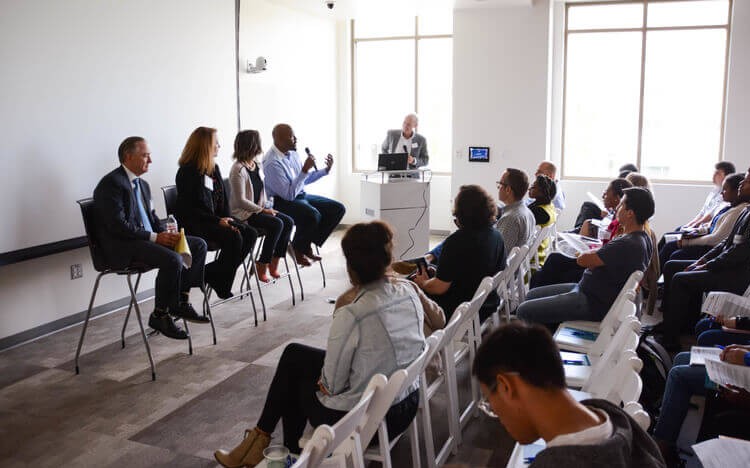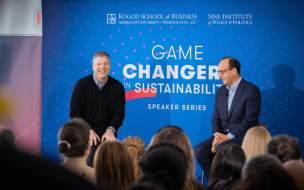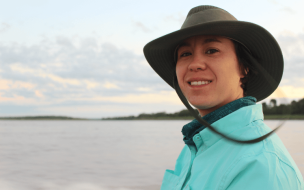Siri Terjesen, director of the American University Center for Innovation, tells us the key ingredients for an innovative environment
Dean Kamen, the inventor of the Segway, once said that innovation is the product of new technology, an old problem, and a big idea. It’s the lifeblood of any industry—the quest to find new solutions for old problems, to make the world a smoother-running place than it was before.But despite 84% of executives considering their future success to be dependent on innovation, only 6% are satisfied with their innovation performance.
Creating an environment where innovative ideas can thrive is challenging, and it requires a few key ingredients.
Gender parity

Siri Terjesen is the director of the American University Center for Innovation, housed within the .
The Center for Innovation is a full-service entrepreneurship center incubating around 25 student ventures at any given time and providing year-round assistance to help the businesses grow—anything from using social media to filling out tax forms.
Recognized in 2017 by AACSB International as one of the top 20 entrepreneurship centers in the world, the Center for Innovation gives each accepted venture $1500 towards their business plan.
Siri teaches classes on innovation to MBA, graduate, and undergraduate students, so she has a few pointers when it comes to pursuing innovation.
One thing she thinks is an important part of the center’s success is a high degree of representation for minority groups, particularly women.
“AU as a university has more women than men—at the undergraduate level it’s 66% women, and at the graduate level it’s at least a 50:50 split—so in our incubator we have more women-led businesses than men-led businesses [at the moment],” she says.
Gender equity is good for innovation, and research backs this up. Accenture recently surveyed over 18,000 workers in 27 countries and found that innovation was significantly higher at organizations that treated women and men more equally.

Students at work in the American University Center for Innovation ©Kogod School of Business
An open environment
Another aspect of the center’s success lies in the open-mindedness practised by leaders like Siri.
“We don’t place any restrictions [on the kind of ventures we take on],” she explains. “We just want interesting, viable enterprises.”
The result is a mixture of nonprofit and for-profit businesses across a variety of industries. Recent ventures have included Be Brave, a wearable technology company that works to prevent sexual assault, and The Atys Project, which uses blockchain to provide stability to retail investors in emerging markets.
In addition to welcoming a diverse mix of ventures, the incubator is open to all students at the university, not just those from the business school.
The result is an environment where everyone can learn from each other, as they all bring something unique to the table.
International innovators
This effect is compounded further when there is greater international representation among innovators—and this is Kogod’s biggest strength.
“You can be from a foreign country or you can be an American, it doesn’t matter, we’ll help you,” says Siri.
The business school as a whole is made up of 25% international students, and Siri believes that international talent is the key to keeping America’s business landscape thriving and innovative.
Research shows that high-skilled immigration directly correlates to increased innovation and economic performance, and companies with employees that have diverse identities and experiences have been repeatedly shown to out-innovate their peers.
Siri believes that the Center for Innovation can be the secret weapon for entrepreneurs from overseas who want to break into the American market.
“It’s really important because they need to get embedded in our ecosystem,” she explains. “They really need to get to know everybody [involved]—the people who can loan them money, their customers, their potential workforce, etcetera.”
Though there is yet to be a startup visa put into place in the United States, Siri still believes that the opportunities are out there for international innovators. She encourages them to persevere and make the most of the resources that centers like the one at Kogod can offer.
“We know that people really need to try things on—it’s not always that someone is a success on their first try,” Siri points out encouragingly. “The average Silicon Valley entrepreneur only succeeds on their seventh venture!”
A representative environment, an open mind to all possibilities, and ample international representation are all must-have ingredients for any innovation hub—and if businesses can replicate this winning formula, it could have big benefits for the economy.
Student Reviews
Kogod School of Business - American University
Clean and well maintained campus
I am completely enamored with this school. The entire student body is driven, inclusive, and highly intelligent. The decision to attend American University is not made haphazardly. Its close proximity to Washington DC, making it one of the most strategically located schools after Georgetown, means it's just a short train ride away. The campus is well-maintained, with mostly attractive buildings, although there are a few that are less appealing. Additionally, there are numerous excellent food options available. The wide range of clubs and organizations to join is remarkable. It is undeniably a school filled with immense passion.
City life
I’m having a wonderful time at American University. I love that I can get to a big city and still feel like a traditional campus. Sincerely, it is a school that may require some adjusting to, but in the end, it is a very good school with numerous opportunities for its students. The atmosphere in AU is so great that it pushes you in a positive way and offers every opportunity you could want.
Amazing helpful professors
American College is an incredible school with astounding teachers. Best professors I could have asked for at an amazing school. My opinion is that American University's professors are its greatest asset. They are extremely intelligent and always eager to assist their students. They go above and beyond in their classes to make sure that their students do their best.
AU Review
The workload is quite high and AU is definitely not an "easy" school. Students take their studies very seriously and can almost always find a group in the library, DAV, Starbucks or MGC. Courses can be quite ambitious if the right courses are offered and the admissions process can be confusing at times, but with the help of an advisor it is quite easy to navigate. The library can be crowded, and while it's not huge, there are plenty of other places to study on campus. The professors really want to help during office hours and interact with students. I've had good experiences with the professors and workload at AU, but it's an expensive city.
Majoring in Political and International Relations
The instructors are unique and the classes can be boring at times. Check-in is stressful (but it is everywhere). The workload is what I expected. The most popular majors are international relations and political science
I Love Being A Musical Theater Major
I love being a musical theater student, if you want to help behind the scenes, if you want to be an assistant director, if you want to be a director, if you want to write, you can do anything at this academy, very supportive, it's amazing, they are always there to help you. This is their working time. Even after the audition tells you what you did wrong, you can do better, or if you get picked, you know why they picked you, which is great
AU's Business Model
Overall, there were a lot of good opportunities at UA, both in terms of course range and faculty. However, I had a few complete misfires. People who shouldn't have taught at all. Like all universities, AU's business model is to hire hands-on assistants so they don't have to pay them extra or perform well. They are signed and if that does not work, they are not hired any more. The problem with this is that you end up with people who are unqualified and bring their own agendas, biases that may or may not be based on research. Most of the professors were absolutely fantastic.
AU - The Real Problem With Academics
Some teachers are amazing, some awful - typical of any school. But the real problem with AU is that many students don't care about academics as much as other things (eg, partying). The academics are really interrupted by the Greek life and the social life of the students. This makes it difficult for students interested in academics to get the most out of their school experience. Some students do not take classes seriously and do not respect teachers and other students. Courses and opportunities at UA are perfect for people who want to take advantage
American University - The Best Place to Study
They know their stuff - I chose American University because the campus is beautiful and the biology program is relatively small. But after the first semester, I realized that all the professors, especially the people in the science department, are experts in their field. They are enthusiastic and helpful in lecturing; even the TAs who teach the labs are amazing and engaging.










